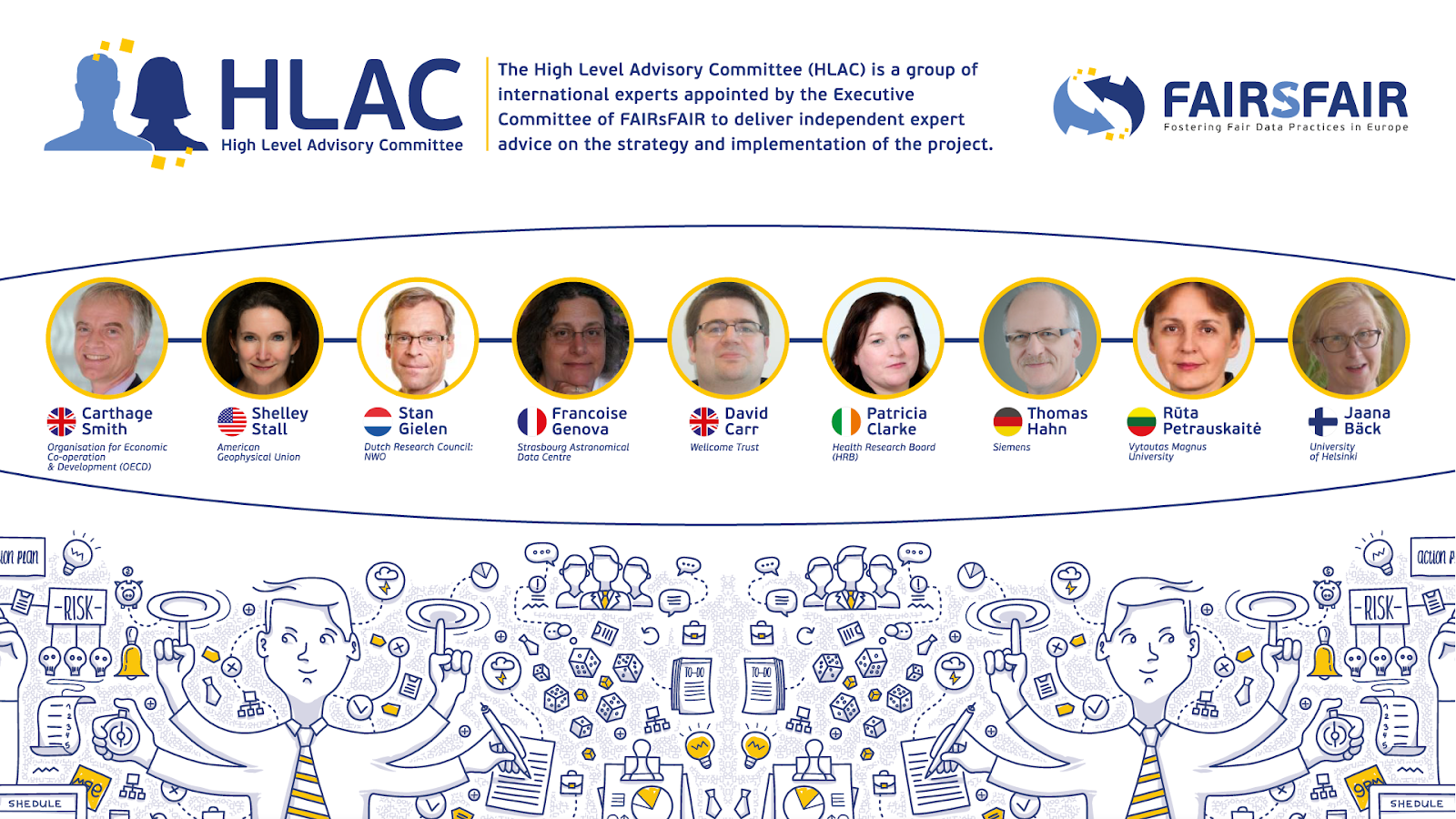
FAIRsFAIR High Level Advisory Committee (HLAC) is a group of international experts appointed by the Executive Committee of FAIRsFAIR to deliver independent expert advice on the strategy and implementation of the project. The HLAC assists the governance bodies of the project – General Assembly, Executive Committee and Project Coordination Office – and ensures that FAIRsFAIR can adapt its strategy and remain relevant in a fast-moving data landscape.
Formally appointed on 3 June 2019, the experts meet periodically to provide guidance on FAIRsFAIR activities implementation. The last meeting was organised on 23 September where the HLAC provided target recommendations on FAIRsFAIR lines of action and reviewed FAIRsFAIR recent reports.
FAIR Practices: Semantics, Interoperability, and Services
Action line overview. As part of the work package dedicated to Semantics, Interoperability, and Services, FAIRsFAIR is developing technologies that support semantic interoperability in a sustainable way to develop FAIR practices. The 2nd Report on FAIR requirements for persistence and interoperability builds on the landscaping exercise published in March 2020 which reviewed and documented the state of FAIR in the European scientific data ecosystem. The report identifies commonalities and possible gaps in semantic interoperability and the use of metadata and persistent identifiers across infrastructures. The new report has been written specifically for researchers, data stewards, and service providers, and is a guide to the use of PIDs, metadata, and semantic interoperability.
Experts’ view and the road ahead. The work undergone as part of this line of action, including the development of tools and standards that can be embedded across repositories and disciplines, is highly dependent on engaging with stakeholders, especially scientific communities and national research systems like the newly formed Council for National Open Science Coordination (CoNOSC), to help solving their particular challenges. With this respect, the engagement of specialists in workshops and the collection of their recommendations on how to implement the FAIR principles has shown its impact. The collaboration with RDA (read the Adoption story) and EOSC (read the contribution to the EOSC SRIA Open Consultation) initiatives is adding an extra mile to the FAIRsFAIR work. The recent Memorandum of Understanding with the FAIRSharing community will also boost international uptake. Now time is ready to start promoting the concrete services, like the first implementation of the FAIR data point that is taking shape, and to develop best practices on its usage.
Recent readings: |
FAIR Policy and Practice
Action line overview. Building upon an analysis of the research data policy and practice landscape in 2019 against the priority and supporting actions outlined in the Turning FAIR into Reality (TFiR) report, FAIRsFAIR prepared a series of recommendations for practical actions to support the realisation of a FAIR ecosystem (D3.4 Recommendations on practice to support FAIR data principles). These recommendations will be used to inform the development of guidance resources to support further adoption of FAIR data standards and practices by research communities. They are released as a living document that will be refined to reflect the forthcoming work in FAIRsFAIR, other projects funded under the INFRAEOSC-05-2018-2019 call, and other relevant initiatives.
Experts’ view and the road ahead. Especially interesting is that the recommendations include discussion about the costs for addressing the FAIR data implementation, career development pathways for data support personnel, feedback and assessment of success in implementing FAIR principles, and addressing sensitive data issues in the framework of GDPR. The challenge at this point in time is for FAIRsFAIR to provide the necessary tools to help researchers in the practical implementation of the recommendations, to ensure a bottom-up approach, from the single data provider, and train users. This encompasses close liaison with the ESFRI cluster projects at large.
Patricia Clarke: “FAIRsFAIR has amplified the message on the need to change to FAIR and provides a clear actionable agenda. Working across initiatives and Agencies, and drawing on cross-cutting and common discussions means that it will remain relevant. The need to enable FAIR outputs is gaining greater acceptance, and FAIRsFAIR has moved beyond the principles narrative to pointing at actions and showing where they are being developed”.
Recent readings: |
| Recommendations on practice to support FAIR data principles |
FAIR Certification
Action line overview. Aligning the CoreTrustSeal Requirements with an assessment of repositories' ability to enable FAIR data is an important part of delivering an EOSC. Trustworthy Digital Repositories (TDR) which enable FAIR data are a dependency for many components of modern, open, distributed research. FAIRsFAIR takes an iterative approach to consider how FAIR object assessment can be aligned with existing CoreTrustSeal requirements. This FAIR oriented elaboration of core Trustworthy Digital Repository (TDR) requirements provides input for the testing and revision of repository evaluation in the EOSC. This supports a range of stakeholders on their journey towards trustworthy report context of data infrastructures, describing the co-dependencies between (meta) data objects and their repository environment, and presenting the developing mapping between repository services that enable FAIR data.
As part of the FAIR Certification work there is the FAIRsFAIR support programme, where ten selected repositories have been selected to receive funding and support to obtain their CoreTrustSeal Certification, and share with us their experiences on how repository practices support the enabling of FAIR data
Experts’ view and the road ahead. According to the HLAC, the role of researchers should be carefully addressed in this workflow, paying special attention at motivating single individuals to undertake manual FAIR assessment when depositing data earlier in their research. Actionable advice to guide researchers already in data collection stage, rather than at the deposition stage when it might be more problematic to rectify deficiencies in metadata, would help. One way to support researchers to improve the FAIRness of their data is by integrating FAIR assessment as part of the data submission process managed by the data providers.
A more robust use of the concept of “maturity” should also be considered with the use of “Infrastructure Support Practices” to address maturity.
The role of publishers in introducing requirements for FAIR on data and code underlying publication should be clearlier addressed, as well as the role of funders to extend support toward researchers to improve FAIR, and identify areas where further support is needed.
FAIR Data Science and Professionalisation
Action line overview. A key deliverable from the FAIRsFAIR project is the development of a FAIR data competence framework to support the uptake of FAIR data principles and practice by higher education institutes. This is in line with the recognition at institutional and European level of the clear need for better training of researchers and students in Open Science and, more closely related to EOSC, in the development of research data management skills and competencies. A groundbreaking study undertaken by FAIRsFAIR partners during the first year of the project surveyed the current research data management landscape in tertiary institutes across Europe. The resulting report, FAIR in European Higher Education, describes the research methodology, tables and discusses the findings, and presents the recommendations which will underpin further work in this area.
Experts’ view and the road ahead. FAIRsFAIR will continue the work “on the ground” to go beyond existing communities of interested stakeholders and reach out for new audiences. Train-the-trainers activities are being organised to engage with more university staff responsible for university programmes, while attention will be put in targeting more national activities and programmes pushing integration of countries not yet represented in the analysis. Finding the right balance is a real challenge as a too much top-down approach might jeopardize bottom-up enthusiasm and creativity. New methods and approaches to the presentation of FAIR culture, e.g. to employ popularisation or journalism, will also be tested.
Recent readings: |
Engagement, Communication and Uptake
Action line overview. A continuous series of activities are being implemented to create a large, international community with members from different European countries, sectors and disciplines to become FAIR multipliers, and, ultimately, active adopters of and advocates for FAIRsFAIR outcomes. A wide yet consistent communication approach is articulated around FAIRsFAIR online web platform (www.fairsfair.eu) and social network channels, offering high-quality resources and articles, branded promotional material and multimedia content designed to raise awareness, support training initiatives, and encourage FAIR adoption. The participation to and organisation of focused workshops, aligned and collocated with the EOSC meetings, maximises project results.
A Synchronisation Force has been set up to maintain a dialogue across the EOSC and FAIR ecosystems, to ensure that project activities dovetail with those of the EOSC Working Groups , so as to maximise collaboration, minimise duplication, and promote adherence to Turning FAIR into Reality, the final report and action plan from the European Commission expert group on FAIR data.
Experts’ view and the road ahead. One key aspect for the success of FAIR is that its implementation matches the requirements and expectations of research disciplines and activities are aligned with standards and practices already in place at specific research communities. The engagement of FAIR Champions selected via open calls during the project goes in this direction, and will include an “Ambassadors” approach to support the outreach of specific project outcomes with their research communities and their countries.
The need to better connect with national initiatives has emerged prominently across all the action lines. To respond to this need, FAIRsFAIR is exploring a series of channels for target dissemination towards research communities at national levels, which include the organisation of regional roadshows targeting specific communities and topics, leveraging on direct support from local contact points such as RDA Europe National Nodes, OpenAIRE NOADs, EOSC regional initiatives (5b projects), Digital repositories at national level and, of course, the FAIR Champions.
Last but not least, the importance for the Synchronisation Force to liaise with the EOSC governance was highlighted. On 3 September 2020 the second report of the FAIRsFAIR Synchronisation Force was presented to the EOSC FAIR Working Group, that will take into consideration in writing of the Interim recommendations for FAIR metrics and service certification report. The preparation of the third and last series of workshops, taking place in Spring 2021, has already started.
Recent readings: |

